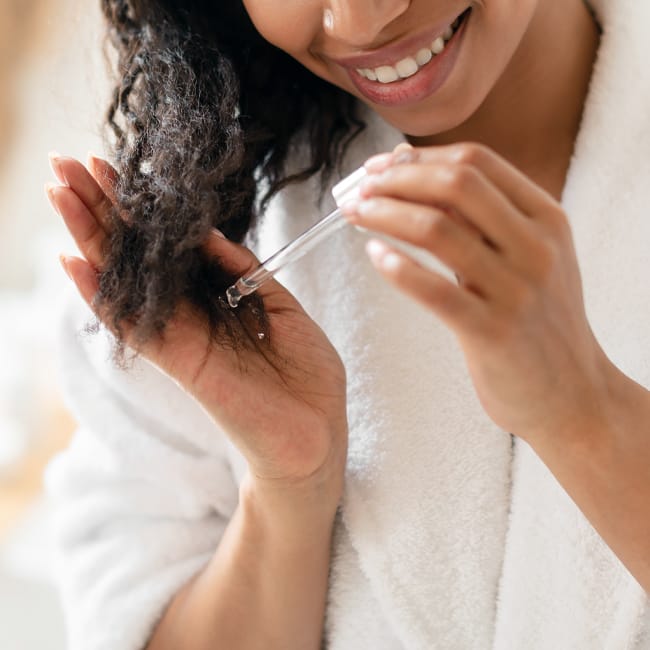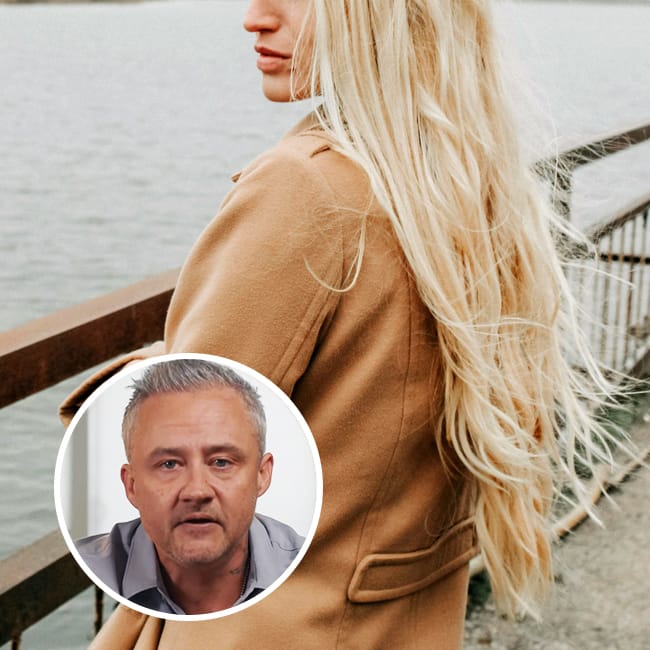This is an archived article and the information in the story may be outdated. Please check the time stamp on the story to see when it was updated last.

They were the photos seen around the Internet. Women posting photos to social media sites of shocking hair loss and balding and pointing the blame squarely at Wen haircare products.
It’s been almost two years since the controversy unfolded and if you’re anything like me, you’ve been wondering how the man behind the brand, Chaz Dean himself, felt about those jarring images and the negativity surrounding Wen products. Well, wonder no more. We chatted exclusively with Chaz Dean about everything from how he heard about the scandal to the lengths he’s gone to prove Wen products are safe. Read on for our exclusive with Chaz Dean below:
SheFinds: How did you first hear about the controversy surrounding your products?
Chaz Dean: I became aware of the magnitude of the controversy when we were served with the lawsuits. Prior to that, there had been no major indication of any controversy at all. Our complaint rates were extremely low, as were our product returns. It was business as usual. We had nothing that implied the extent of what was alleged in those lawsuits.
SF: What was your reaction to seeing the photos and reading what was being said about Wen products?
CD: To see what was being said in the press and in the lawsuits about a brand I poured my heart and soul into for over 20 years really hurt me to my core. Wen has been my everything for so long, I was torn apart.
My first question to my team was how do we help these people? I’ve spent my life helping people and working to give my clients beautiful, healthy hair. I understand that hair loss is a very emotional issue for anyone suffering from it, so no matter what the outcome was going to be of the allegations, there were a lot of people involved who needed support and deserved answers.
Knowing how intricate the hair loss category is, the best first step for us was to test the products.
SF: You jumped into action after those photos starting circulating; what did you do to determine if Wen products are safe?
CD: Even before the lawsuits, we had done industry standard RIPT tests to confirm that the products were safe prior to being sold. In fact, over 2,000 people have been involved in these tests and we have never had a problem.
I needed to be sure that we did our due diligence because I was really concerned that the people involved in this were not be getting the medical treatment that they needed for the actual medical cause of their hair loss.
As a first step, we consulted with dermatologists and toxicologists about the product. We had them analyze the formulas, looking for anything that might point back to potential issues. They’ve researched every single ingredient and how they interact with each other and after a thorough analysis we received confirmation that the formulations do not chemically have the ability to cause hair loss.
We followed up those consultations and analyzations with a variety of additional testing, including an endotoxin review where we tested the products under high heat conditions (mimicking the temperatures of a flat iron) to make sure no new compounds were formed under that heat. Lastly, our retail partner, Guthy Renker, commissioned a clinical trial to test the product against a nationally known competitor brand (commonly used by the general public) and the results were comparable, proving that Wen did not have any increased occurrence of hair loss than with a mass market shampoo.
SF: Once and for all, what’s the right way to use Wen’s cleansing conditioner?
CD: First, make sure that you review the instructions provided on our labels to ensure that you are using the appropriate amount of product for your hair length and texture. I always recommend that you cleanse your hair twice, splitting the amount of product that you will be using in half instead of doing it all at once.
First, rinse your hair with water and pump half of the recommended amount into your palm. Massage the product into your hair thoroughly. Rinse and repeat once again. Make sure that you rinse the product completely! Lastly, if desired, apply a small amount of the conditioner to the mid-shaft and ends of your hair as a leave-in conditioner.
SF: Can you talk about some of the myths that have been given merit and whether or not they actually have any weight?
CD: One of the biggest myths currently being talked about in the mainstream media is if a cosmetic product (whether it is a cleansing conditioner, shampoo, soap, dry shampoo, etc.) can impede hair growth. From all of the testing that has been conducted and our consultations with scientists and dermatologists, we have proven that this school of thought is medically impossible. Hair loss has many possible causes. The science shows no relation to hair cleansing products and this condition. Rather, people experiencing hair loss should consult a medical professional and check for things like Alopecia Areata, which is a genetic condition in which the body attacks the hair follicle, Telogen Effluvium, which is a temporary hair loss condition, or other medical causes like medication use, age-related thinning, dietary issues or medical conditions with known links to hair loss.
Another point to consider is the lack of consistency of the Wen allegations. We didn’t have a constant or consistent pool of complaints. In fact, the complaints only increased for a short period of time when the story hit the news and since then has decreased again. If there was any truth to what has been alleged, my understanding is that the results would have a lot more consistency.
SF: Are Wen products safe for all women with all different hair types?
CD: Yes. My products were designed to be safe and healthy for your hair. This is my philosophy, as I don’t believe in using hot tools or any ingredients that strip the hair of natural oils. We also have products for different hair types, depending on your needs.
SF: What’s the biggest lesson you learned having been through this experience?
CD: There are not a lot of resources for people who are suffering from hair loss. If information was more readily available, we could decrease the number of misconceptions. It’s a complicated subject matter and so important that we focus our energy on viable causes with potential solutions.
I also learned about the power of never giving up and having faith. I had to dig very deep and believe in myself and my brand. It was hard to keep pushing through every day. We are going to keep fighting to educate and do everything that we can to help those who are silently suffering.
Chaz Dean and the Wen haircare team didn’t stop there, though. They also consulted with Dr. Anthony Rossi, Board Certified Dermatologist in New York City, to get to the bottom of the hair loss claims. Here’s more from Dr. Rossi:
SheFinds: If Wen’s products were deemed safe, what could be the cause for the hair loss some women experienced?
Dr. Anthony Rossi: There are many different types of hair loss that can occur. According to the International Society for Hair Restoration Surgeons (ISHRS), a total of 35 million men and 21 million women in the United States are suffering from some form of hair loss. Interestingly, 40% of men will have noticeable signs of hair loss or male pattern baldness by the time they hit the age of 35 years old. The percentage increasingly grows to 65% by the time they hit 60 years old to a staggering 70% by the age of 80. Approximately 40% of women by age 50 show signs of hair loss and less than 45% of women actually reach the age of 80 with a full head of hair. Hair loss, especially in females, may not be appreciable until a significant amount of hair density is noted. Hair loss typically falls into one of two categories:
a) Non-scarring hair loss in which the hair can regrow
b) Scarring hair loss in which the hair cannot regrow. Examples of non-scarring hair loss are:
· Female pattern hair loss (also called female pattern baldness or androgenetic alopecia)
· Telogen Effluvium
· Alopecia Areata
Additionally, multiple physiologic or iatrogenic causes can contribute to hair loss (most likely because of telogen effluvium or anagen effluvium) including the following:
a) High-stress life events
b) Weight loss/gain (rapid or excessive)
c) Certain medications/medication changes (e.g., antimiotic drugs, cimetidine, oral retinoids, antidepressants, mood stabilizers, beta blockers, anticoagulants)
d) Post-pregnancy
e) Certain illnesses (e.g., lupus, diabetes, thyroid disease, dermatomyosis, mixed connective tissue disease);
f) Anemia
g) Hormonal changes (e.g., menopause, beginning or ceasing oral contraceptives);
h) Post-surgery
SF: What was done to determine if Wen products are safe?
AR: In addition to the original in-lab testing, Wen also ran further clinicals as outlined below.
a) Wen completed a 6 week in-use human safety test of WEN products with a Board Certified Dermatologist. There were three groups evaluated during this testing.
1. One control group using a commercial shampoo and conditioner
2. One group using Wen and rinsing it out
3. One group using Wen and leaving in.
Results: None of the subjects in any group during this test showed hair loss or reaction as a result of using WEN products.
b) WEN conducted Human Patch Testing, which is the application of the products onto the skin to evaluate if any sensitization or reaction will occur. Since 2006, WEN conducted 52 discrete patch tests involving 2,729 human subjects to assess the irritation and sensitization (contact allergy) potential of various WEN products after repeated application to the skin.
Results: For each individual patch tests, there were no reported adverse events.
c) Wen performed In-vitro Irritation and Sensitization Testing on skin cells.
Results: These tests did not show any effects on the skin cell lines.
In relation to this, Wen also performed a Skin Sensitization Risk Assessment, where their scientists gathered information from cosmetic trade industry and consumer safety groups in order to evaluate the sensitization potential of individual ingredients in WEN cleansing conditioners.
Results: The analysis indicates that exposure to the individual ingredients present in WEN cleansing conditioners would not be expected to induce dermal sensitization in a consumer. These findings are consistent with the results of the in-vitro and human clinical testing that WEN has performed over the years. Many of the ingredients in the WEN line is also used in many over the counter products.
d) The WEN team and scientists evaluated the frequency of use of the WEN product ingredients in other personal care products on the market. The National Library of Medicine’s Household Products Database and the Environmental Working Group’s (EWG) Skin Deep Cosmetic Database were used to identify other personal and consumer ingredients in products that are available on the market. More than 20,000 personal care products contained one or more of the ingredients used in WEN products.
Results: The results from this evaluation demonstrate that the ingredients used in WEN products are commonly used in a wide variety of consumer and personal care products that are currently on the market.
e) An ingredient review was performed, where a toxicological review of the chemical ingredients associated with WEN cleansing conditioners was done. This was done to evaluate the potential hazard associated with using the products.
Results: Based on this hazard assessment, and the fact that the presence of the chemicals in the final product is significantly less than 10%, it was determined that the chemical formulation of this product does not present an acute or chronic toxicological hazard when used in the intended manner.
f) WEN performed Chemical Stability Testing which tested if the products would change or degrade when subjected to scenarios that could be common, such as heating up during hair drying. Scientists subjected WEN products to temperatures of 60 and 185 degrees C (to simulate the use of a hair dryer and flatiron hair straightener, respectively) in order to evaluate the chemical stability of the WEN products.
Results: There were no changes in chemical composition occurring under high-heat conditions associated with the use of the product.
g) WEN conducted analytical testing for individual components, including preservatives, present in WEN products. Analytical analyses were conducted to determine the concentration of the active preservative ingredients and other constituents present in WEN products as well as competitor products.
Results: Concentrations of the evaluated components in the final products were found to be in agreement with expected levels and did not exceed guideline for maximum recommended levels of use for the specified product.
h) Endotoxin screening was performed that looks for bacterial growth or contamination. Endotoxin screening of WEN products was performed by a GMP compliant, ISO registered, and DEA licensed endotoxin testing facility. The bacterial endotoxin test was performed in accordance to USP guidelines in compliance to FDA regulations.
Results: These endotoxin testing results demonstrate that WEN products were manufactured in a sterile environment with sterile ingredients and contamination was not observed.
SF: Are Wen products safe for all women with all different hair types?
AR: Yes, none of the ingredients were needed to be changed and therefore all hair types can continue to use the products.
SF: What are a few precautionary measures women should take when trying ANY new products?
AR: With any topical or cosmetic product people can do a use test where they apply the product to their forearm for consecutive days to see if they develop a reaction to it.
SF: Lastly, what should women do if they experience more hair loss than usual or balding?
AR: If any women feels that her hair is thinning or there are areas of hair loss, she should see a board certified dermatologist. Dermatologists are experts in skin hair and nails and the diseases that affect such, including hair loss. It is important to actually be evaluated because there are multiple internal problems that can lead to hair loss.
Don’t miss our favorite winter sweaters under $50.
[Photo: Instagram/Wen]



























